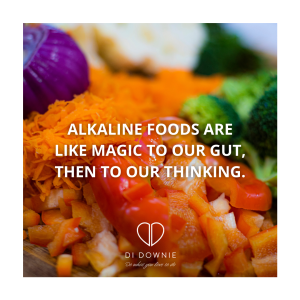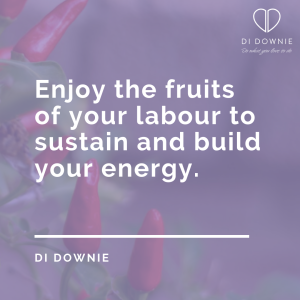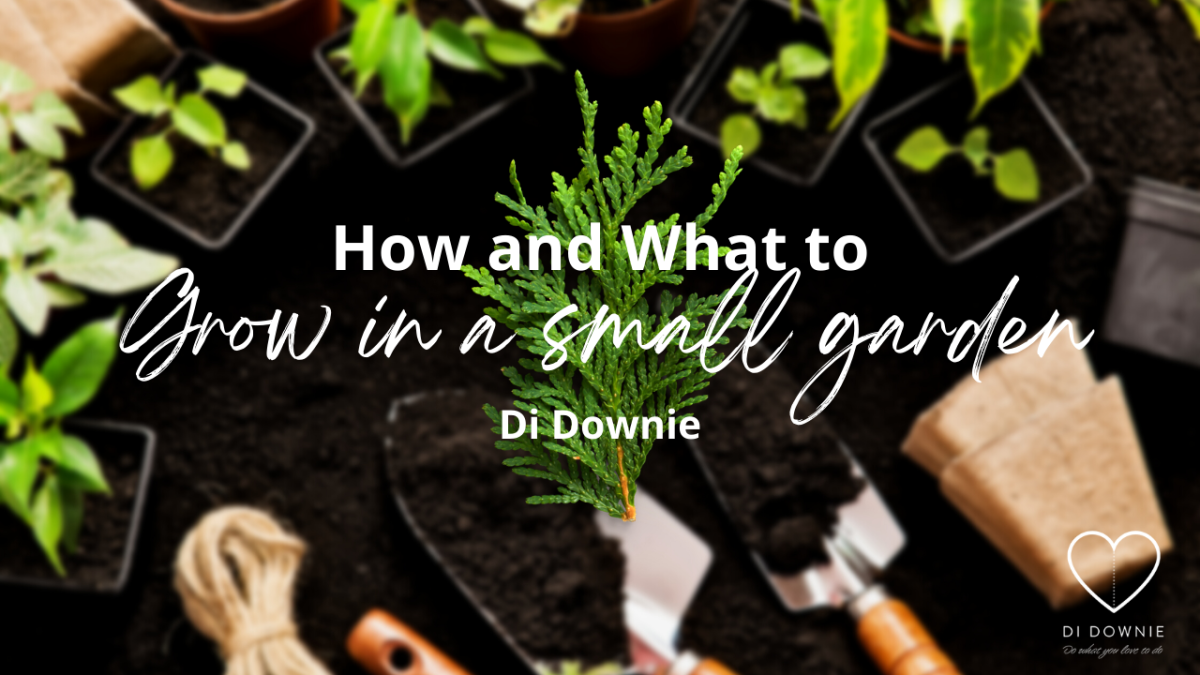“We are what we eat” – Anne Wigmore
“Plan good food to eat good food” – Di Downie
“Our food and drink affects our decision making”. – Di Downie
 Come with me on a short journey of re-skilling and rethinking our daily food intake, for our personal lifestyles for this day and age.
Come with me on a short journey of re-skilling and rethinking our daily food intake, for our personal lifestyles for this day and age.
Here I am giving you simple steps to eat and drink for the current times. Let’s face it, we are not living in the 50s, but most people still eat as though we are.
Here is your Free Simply Food E-Book.
Download it, scribble on it, pick the eyes out of the tiny little book as to what small things you are going to change to re-skill and rethink your daily food intake for healthy bloods, less brain fog, feeling fabulous!
This E-book is for you if you:
- want a starting point to a simple food routine.
- have a desire to re-skill and rethink your daily food intake.
- don’t know how to start to tweak your already healthy eating.
- if you know me, you want to read how I design my food plan.
Let’s face it, women are the major influencers of change, in the home at work, in our communities.
Women are mentors, often without knowing it and taking it for granted.
 Eating and drinking with purpose has a major effect on what we say, what we think, how we influence our change in our home at work, in our community. Planning good food to eat good food is part of living on purpose.
Eating and drinking with purpose has a major effect on what we say, what we think, how we influence our change in our home at work, in our community. Planning good food to eat good food is part of living on purpose.
You might already be well on your way to being a conscious food planner, especially as you are already reading this blog post.
Tip 2 in the Simply Food E -Book is about carving out time to grow some of your food.
People tell me that I take for granted what I know about gardening and growing our own food. I do take it for granted, I grew up in the country, also lived in the country as an adult until my mid-forties so growing our own food was simply a part of my lifestyle.
The other factor that has grown my skills to be a great gardener and grower of our food is that at times in my life I have struggled financially through droughts being on a wheat and sheep farm, hard economic times with high interest rates that hit my retail business hard, not to mention having inadequate systems in place in one of my businesses for staff to alleviate me of some income.
Life does through us curve balls.
Growing food, having a vegetable garden, fruit trees has given me a green thumb and a mass of experience of growing a variety of plants to eat and heal with.
Let me add some further tips for you about growing your own food, as I have proven many times to go and pick a salad for dinner, a hand full of herbs for a winter soup, a basket full of fruit for lunches is only part of the benefits to growing your own food.
The other benefits of growing some of our food, your garden , or pots will demand your attention if you want good results. Just like your kids, if you want good relationships with your kids we have to spend time to listen, watch and learn, same with our plants.
Further tips to growing some of your own food:
- Only grow what is easy to grow where you live.
- Only grow what you love to eat, for example I love salads I grow lettuce, spinachs, spring onions, chives, coriander, basil, capsicums, chillies.
- Start of small. If you are new to gardening. Grow a pot of basil first, put it in a warm spot, water it 3 times a week, fertilize it bi weekly. Other than that … eat it!
- If you are going to start a vegetable garden, I’d recommend digging out the old soil that’s there and bring in some new soil that’s organic. Again start small!
- I buy organic seedlings. I only grow from seeds when plants like lettuce or tomatoes self seed.
- When planting your seedlings water in well and push down around the roots gently to take the air out from around the baby roots.
- For the first week keep your baby plants well watered but don’t drown them with kindness.
Talk to your vegetables they have ears and feelings…. I know…. a bit weird but it works.
Take notice of your vegetables and herbs and trees, like us, they like to be noticed.
Enjoy getting your hands in the earth, yep dirt gets under your finger nails, its ok, it comes out.
Appreciate that you can take time to grow your own food. Be thankful!
Love eating your harvest. Be thankful!
You might even eat the odd slug or worm, be thankful that you are not eating pesticides and laugh about it.
Here is another post about growing your own food.
I trust that by giving you more info about tip 2 in growing your own food has inspired you to get down and dirty, connect with nature and get some really good food for your body.
To inspire you further to download my Simply Food E-Book below is further information on Tip 5 . Here is further info about Alkaline Food.
I have people ask me “what is alkaline food”?
So lets start there: What would I consider to be my favourite alkaline foods:
Firstly why eat as much alkaline food as you can?
The more alkaline food we can eat along with minimal acid foods will give us a more alkaline blood PH to build healthy cells needed for aging, immunity, clarity of thought. Lowering the risk of pain, inflammation, and low immune system.
 What are my favourite Alkaline foods:
What are my favourite Alkaline foods:
Avocadoes:
- balances pH
antioxidant - high in monounsaturated fats, helps reduce cardiovascular disease and balances blood sugar
- tons of potassium, which reduces blood pressure.
Capsicums also known as Bell Peppers:
- natural food enhancer
- antioxidant
- rich in vitamins C, A, and E
- high in fibre
Broccoli
- supports the digestive system
- increases alkalinity
- inhibits the growth of cancerous cells
- helps the natural detox of the body
- like everything in this list helps inflammation
- builds bones
Spinach:
- Super easy to grow
- increases quality of red blood cells
- high in vitamins K, A, C,
- high in iron, potassium, magnesium. Spinach is also rich in chlorophyll, which can decrease inflammation with its chlorophyll
Celery:
- alkaline
- tons of vitamin C
- high in fibre good for constipations and weight balance
- high water content
Almonds:
- the most alkaline of all the nuts
- healthy omega-3 fatty acids, helps to protects the heart. They are
- rich in protein,
- antioxidant
- high vitamin E, and calcium, iron, magnesium, and manganese
- phytonutrients can reduce insulin resistance
Bananas:
- rich in calcium
- balances blood sugar
- can improve sleep when eaten before bed
- high in magnesium and potassium
- simply delicious
- can get all year round in my country
Basil:
- reduce blood glucose levels,
- fight inflammation,
- boost immunity,
- treat mood swings
- enhances the flavour and alkalinity of any dish cooked or uncooked
Root Vegetables:
- can make fabulous healthy, alkalizing additions to the diet
- improves cardiovascular functions especially beetroot
- Carrots, as you know, improves our vision and skin
- boosts the health of gut microbiota
- always eat onions and garlic for inflammation.
Lemons:
- high in citric and ascorbic acids
- rich sources of vitamin C
- vitamin A, potassium, magnesium, and folate.
- contain flavonoids that help fight neurodegenerative conditions, diabetes, atherosclerosis, and cancer, potentially
Have very minimal diary foods, such a cheeses, butters, milk, cow yogurts…Diary is NOT alkaline.
Have very minimal meat, it is NOT alkaline and you can get plenty of protein without meat.
Drink plenty of good water.
In summary:
- Have fun growing some of your food.
- Get down and dirty with nature to help connect your dots.
- Carving out time to grow some of your food it is a gift to yourself.
- Eat Alkaline Food with purpose.
- Eat very minimal Acid Foods with purpose.
- Drink good water and aim for 3 litres a day.
- Remember the food we eat determines how we make decisions.
Download the Simply Food E-Book here, it will make all the difference, especially those of us who are influencing people in our family, at work, in our communities.
Women are the real mentors on the globe, good food and drink helps us to connect with ourselves in more ways than one.
Sending you a global hug,

